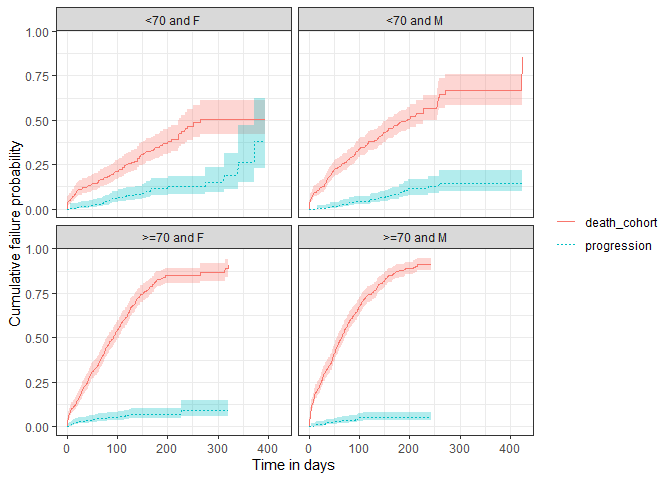
The hardware and bandwidth for this mirror is donated by METANET, the Webhosting and Full Service-Cloud Provider.
If you wish to report a bug, or if you are interested in having us mirror your free-software or open-source project, please feel free to contact us at mirror[@]metanet.ch.

CohortSurvival contains functions for extracting and summarising survival data using the OMOP common data model.
You can install CohortSurvival like so:
install.packages("CohortSurvival")The CohortSurvival package is designed to work with data in the OMOP CDM format, so our first step is to create a reference to the data using the CDMConnector package.
For this example we´ll use a cdm reference containing the MGUS2
dataset from the survival package (which we transformed into a set of
OMOP CDM style cohort tables). The MGUS2 dataset contains survival data
of 1341 sequential patients with monoclonal gammopathy of undetermined
significance (MGUS). For more information see
?survival::mgus2.
library(CDMConnector)
library(CohortSurvival)
library(dplyr)
library(ggplot2)
cdm <- CohortSurvival::mockMGUS2cdm()In our cdm reference we have three cohort tables of interest: 1) MGUS diagnosis cohort
cdm$mgus_diagnosis |>
glimpse()
#> Rows: ??
#> Columns: 10
#> Database: DuckDB v1.1.3 [lopezk@Windows 10 x64:R 4.3.2/:memory:]
#> $ cohort_definition_id <int> 1, 1, 1, 1, 1, 1, 1, 1, 1, 1, 1, 1, 1, 1, 1, 1, 1…
#> $ subject_id <int> 1, 2, 3, 4, 5, 6, 7, 8, 9, 10, 11, 12, 13, 14, 15…
#> $ cohort_start_date <date> 1981-01-01, 1968-01-01, 1980-01-01, 1977-01-01, …
#> $ cohort_end_date <date> 1981-01-01, 1968-01-01, 1980-01-01, 1977-01-01, …
#> $ age <dbl> 88, 78, 94, 68, 90, 90, 89, 87, 86, 79, 86, 89, 8…
#> $ sex <fct> F, F, M, M, F, M, F, F, F, F, M, F, M, F, M, F, F…
#> $ hgb <dbl> 13.1, 11.5, 10.5, 15.2, 10.7, 12.9, 10.5, 12.3, 1…
#> $ creat <dbl> 1.30, 1.20, 1.50, 1.20, 0.80, 1.00, 0.90, 1.20, 0…
#> $ mspike <dbl> 0.5, 2.0, 2.6, 1.2, 1.0, 0.5, 1.3, 1.6, 2.4, 2.3,…
#> $ age_group <chr> ">=70", ">=70", ">=70", "<70", ">=70", ">=70", ">…cdm$progression |>
glimpse()
#> Rows: ??
#> Columns: 4
#> Database: DuckDB v1.1.3 [lopezk@Windows 10 x64:R 4.3.2/:memory:]
#> $ cohort_definition_id <int> 1, 1, 1, 1, 1, 1, 1, 1, 1, 1, 1, 1, 1, 1, 1, 1, 1…
#> $ subject_id <int> 56, 81, 83, 111, 124, 127, 147, 163, 165, 167, 18…
#> $ cohort_start_date <date> 1978-01-30, 1985-01-15, 1974-08-17, 1993-01-14, …
#> $ cohort_end_date <date> 1978-01-30, 1985-01-15, 1974-08-17, 1993-01-14, …cdm$death_cohort |>
glimpse()
#> Rows: ??
#> Columns: 4
#> Database: DuckDB v1.1.3 [lopezk@Windows 10 x64:R 4.3.2/:memory:]
#> $ cohort_definition_id <int> 1, 1, 1, 1, 1, 1, 1, 1, 1, 1, 1, 1, 1, 1, 1, 1, 1…
#> $ subject_id <int> 1, 2, 3, 4, 5, 6, 7, 8, 10, 11, 12, 13, 14, 15, 1…
#> $ cohort_start_date <date> 1981-01-31, 1968-01-26, 1980-02-16, 1977-04-03, …
#> $ cohort_end_date <date> 1981-01-31, 1968-01-26, 1980-02-16, 1977-04-03, …We can get survival estimates for death following MGUS diagnosis like so:
MGUS_death <- estimateSingleEventSurvival(cdm,
targetCohortTable = "mgus_diagnosis",
outcomeCohortTable = "death_cohort"
)
MGUS_death |>
glimpse()
#> Rows: 1,354
#> Columns: 13
#> $ result_id <int> 1, 1, 1, 1, 1, 1, 1, 1, 1, 1, 1, 1, 1, 1, 1, 1, 1, 1,…
#> $ cdm_name <chr> "mock", "mock", "mock", "mock", "mock", "mock", "mock…
#> $ group_name <chr> "target_cohort", "target_cohort", "target_cohort", "t…
#> $ group_level <chr> "mgus_diagnosis", "mgus_diagnosis", "mgus_diagnosis",…
#> $ strata_name <chr> "overall", "overall", "overall", "overall", "overall"…
#> $ strata_level <chr> "overall", "overall", "overall", "overall", "overall"…
#> $ variable_name <chr> "outcome", "outcome", "outcome", "outcome", "outcome"…
#> $ variable_level <chr> "death_cohort", "death_cohort", "death_cohort", "deat…
#> $ estimate_name <chr> "estimate", "estimate_95CI_lower", "estimate_95CI_upp…
#> $ estimate_type <chr> "numeric", "numeric", "numeric", "numeric", "numeric"…
#> $ estimate_value <chr> "1", "1", "1", "0.9697", "0.9607", "0.9787", "0.9494"…
#> $ additional_name <chr> "time", "time", "time", "time", "time", "time", "time…
#> $ additional_level <chr> "0", "0", "0", "1", "1", "1", "2", "2", "2", "3", "3"…Now that we have our results, we can quickly create a plot summarising survival over time.
plotSurvival(MGUS_death)
Among others, we can check the survival summary of our target and outcome cohorts of interest:
tableSurvival(MGUS_death, times = c(30,60,180))| CDM name | Target cohort | Outcome name |
Estimate name
|
||||||
|---|---|---|---|---|---|---|---|---|---|
| Number records | Number events | Median survival (95% CI) | Restricted mean survival (SE) | 30 days survival estimate | 60 days survival estimate | 180 days survival estimate | |||
| mock | mgus_diagnosis | death_cohort | 1,384 | 963 | 98.00 (92.00, 103.00) | 133.00 (4.00) | 79.39 (77.28, 81.55) | 66.15 (63.70, 68.70) | 25.90 (23.35, 28.72) |
As well as estimating survival for our cohort overall, we can also estimate survival by strata. These strata are based on variables that have been added to our target cohort previously as columns.
MGUS_death <- estimateSingleEventSurvival(cdm,
targetCohortTable = "mgus_diagnosis",
outcomeCohortTable = "death_cohort",
strata = list(c("age_group"),
c("sex"),
c("age_group", "sex"))
)
plotSurvival(MGUS_death,
colour = "strata_level",
facet= "strata_name")
The package also allows to estimate survival of both an outcome and competing risk outcome together. We can then stratify, see information on events or summarise the estimates in the same way we did for the single event survival analysis.
MGUS_death_prog <- estimateCompetingRiskSurvival(cdm,
targetCohortTable = "mgus_diagnosis",
outcomeCohortTable = "progression",
competingOutcomeCohortTable = "death_cohort"
)
plotSurvival(MGUS_death_prog, cumulativeFailure = TRUE,
colour = "variable_level")
As with single event survival, we can stratify our competing risk analysis.
MGUS_death_prog <- estimateCompetingRiskSurvival(cdm,
targetCohortTable = "mgus_diagnosis",
outcomeCohortTable = "progression",
competingOutcomeCohortTable = "death_cohort",
strata = list(c("age_group", "sex"))
)
plotSurvival(MGUS_death_prog |>
dplyr::filter(strata_name != "overall"),
cumulativeFailure = TRUE,
facet = "strata_level",
colour = "variable_level")
cdmDisconnect(cdm)You can check additional functionality of the package on its website.
These binaries (installable software) and packages are in development.
They may not be fully stable and should be used with caution. We make no claims about them.